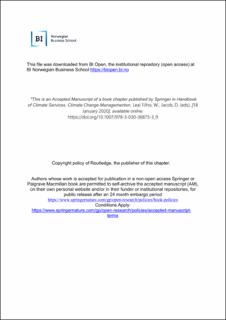Public-Private Cooperation for Climate Adaptation - Providing Insurance Loss Data to the Municipalities
Chapter
Accepted version
Permanent lenke
https://hdl.handle.net/11250/2989564Utgivelsesdato
2020Metadata
Vis full innførselSamlinger
- Book chapters [38]
Originalversjon
Leal Filho, W., Jacob, D. (eds). (2020). Handbook of Climate Services. Springer. https://link.springer.com/book/10.1007/978-3-030-36875-3Sammendrag
This chapter discusses experiences from public-private cooperation for climate services providing insurance loss data (from weather related damage) on asset level for Norwegian municipalities.‘Insurance loss data’ display insurance adjustments on address level after nature hazards. The chapter compiles results from three successive studies performed in the period from 2013 to 2018. The studies examined the utility value of insurance loss data for 10 municipalities and investigated the attitudes in the 8 largest Norwegian insurance companies for sharing such data. The findings demonstrate that insurance loss data on asset level can improve municipal understanding of both current and future climate risks, and thus improve the effect and quality of measures to prevent and adapt to such risks. However, with respect to data quality, precise time and place for damage occurrence is essential. With respect to data availability, it is essential that the insurance companies are willing to share loss data with municipalities working with mitigation of risks. Commercial sensitivity is important for the companies, and therefore only restricted entities should be allowed access to the data. The insurance companies also stressed their responsibility for protection of privacy for their customers. Finding solutions to the data access and privacy is up to national authorities. As a direct follow-up of the findings and the recommendations from the studies, The Norwegian Directorate for Civil Protection and Finance Norway are cooperating in developing a climate service called ‘knowledge bank’ for compiling and providing access to data on natural hazard events. The knowledge bank is relating to both current and future climate, strengthening municipalities in their work on risk prevention, and climate change adaptation. Loss data from insurance companies are one type of data they are including.
